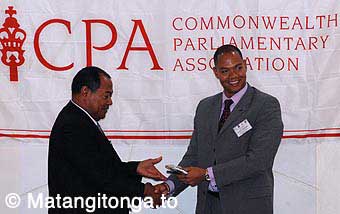
By Pesi Fonua
A workshop on "Parliament and the Media" held in Tonga this week called on the Tongan government to draft and enact a Freedom of Information Act "as a matter of priority".
At the end of three-days deliberation in Nuku'alofa yesterday, October 1, the participants, who included some Cabinet ministers and prominent parliamentarians including the Attorney General, recognised the importance of freedom of information in promoting good governance, participatory democracy and effective development.
The workshop suggested that any freedom of information law should be designed to ensure at a minimum that information - with only few exceptions - held by the state is readily available to the public.
Right to know
The workshop dealt with a number of issues, relating to the media as the "Fourth Estate", and its obligation to meet the right of the public to know what is going on in parliament and in government.
Some of the issues that were highlighted during the workshop included:
- the banning of reporters from Tonga's parliament by the Speaker of the House;
- the absence of a definitive disclosure policy of government on government information;
- the difficulty of acquiring bills that have been tabled and debated in the House;
- the withholding of the budget statement and the budget until it is passed by the House;
- the conflict of interest of members of parliament;
- law makers who do not disclose their business interests before they enter the House;
- the fact that members decide their own salaries; and
- the misuse by members of their parliamentary privilege by attacking private individuals who do not have the right of reply in the House.
The conflict of interest by Tongan members of parliament was realised to be a stumbling block for the free flow of information from the House to the media.
A member of parliament from New Zealand, Mrs Jill Pettis, a presenter at the workshop, was astounded to learn that Tonga's members of parliament set their own salaries. Both Australia and New Zealand had handed over the setting of their salaries to a Higher Salary Committee during the 1970s.

Vigorous
Participants in the workshop included Tongan Cabinet Ministers and members of parliament, an Australian MP, a New Zealand MP, the Clerk of the House of Representatives of Australia and its Media and Communications Manager, experts on Freedom of Information from the Commonwealth Parliamentary Association, the UNDP Pacific Centre, and the Pacific Islands Forum Secretariat, along with local representatives of civil societies, interest groups, the Executive Director of the Pacific Islands News Agency, and members of the Tongan media. Observers included representatives of the New Zealand High Commission and NZaid.
The fact that Tonga is in the process of a political transition into a more democratic system of government, made the discussions during the workshop vigorous and enlightening.
Fourth Estate
The meaning of the term Fourth Estate was defined by Ms Julie Owens, MP from Australia, who said that the term was first used in the British parliamentary context. "Henry Fielding said in 1752 that political writers concentrated on the three estates of Kings, Lords and Commons and took no notice of the Fourth Estate - the Mob.
"It was Edmund Burke in 1841 who reflected that there were three estates in parliament but looking up into the Reporters' Gallery, he said there sat a Fourth Estate that was by far the most important. ..Burke went to say that democracy is an inevitable consequence of writing," she said.
The Tongan media noted that in Tonga's case we can say that the King in Privy Council is the First Estate, the Cabinet is the Second Estate, the House is the Third Estate and the Media is the Fourth Estate.
The Chairman of the workshop, Samiu Vaipulu (Chairman of the Whole House Committee of the Tongan parliament) said at the end of the workshop that the issues raised showed that there was a lot of work to be done in order for Tonga to attain a more democratic form of government that it is striving for. He was very supportive of the call for a Freedom of Information Act for Tonga.

Public consultation
Dr Henry Ivarature, from the Pacific Islands Forum Secretariat, on a session on Freedom of Information Initiatives in the Pacific, said that only the Cook Islands had enacted an FOI Act earlier this year and a lesson learned from the Cook Island's experience was the need for public consultation before the Act was implemented.
Ms Charmaine Rodrigues, from the UNDP Pacific Centre. Suva, also stressed the importance for an in-depth public consultation before a Freedom of Information regime is drafted. Along with Dr Ivarature, and Shem Baldeosingh (Commonwealth Parliamentary Association Secretariat) she offered assistance when Tonga decides to proceed with the drafting of FOI legislation.

Government draft bill
Prince Tu'ipelehake, a Nobles Representative to the Tongan Parliament, proposed that an FOI bill could be presented to the House as a Private Bill from the elected members of the House. Then on the second day, when the Attorney General, Hon. 'Alisi Taumoepeau, attended the workshop Mrs Jill Pettis suggested that FOI legislation might be presented by government.
Jill pointed out the complexity of FOI legislation and that government would probably have the resources to do the work. In addition she believed it would be good for the image of government to present such a bill.
Hon. 'Alisi Taumoepeau agreed and said if the Forum (workshop) would recommend that government draft FOI legislation she would support it and put it through to government, but she did not think that a FOI bill could be tabled into the House this year.

Encouragement
In its final recommendations the workshop participants made a number of observations and suggestions for consideration, in particular by Government, officials, donors and development partners.
Regarding the Tonga Legislative Assembly, "encouraged parliament to ensure its proceedings are more open to the public and the media," and radio broadcasts of proceedings were suggested as a way to increase the public's awareness
It also highlighted the need for the relationship between Government, Parliament and the Media to be taken into account during the political reform process, and urged the Speaker to make provision of media and public gallery and broadcast facilities in parliament.
Regarding the media the workshop participants recognised the legitimate and important role of the media in providing full, balanced, accurate and objective coverage of Parliament and in scrutinizing its work.



